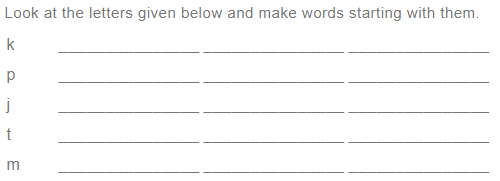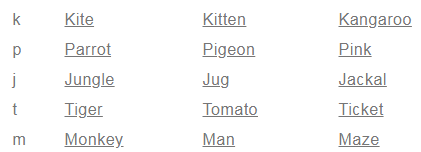NCERT Solutions for Class 2 English Unit 9 - The Magic Porridge Pot
Page No 149:
Question 1: Learn New Words
A) Magic
B) Cook
C) Porridge
D) Spilling
E) Whole
F) Village
Answer:
A) Magic: supernatural event Example sentences:
1) A magician performed a magic in my school.
2) I can perform magic with playing cards.
B) Cook: to prepare food Example sentences:
1) Do not cook food on high flame.
2) My mother cooks very delicious food.
C) Porridge: cereal boiled in water Example sentences:
1) Eating porridge is a healthy option.
2) Porridge is very soft to eat.
D) Spilling: to overflow Example sentences:
1) Wipe up the spilling carefully.
2) The spilling has created a mess in the room.
E) Whole: all or entire Example sentences:
1) I spent the whole day travelling.
2) The whole class was punished by the teacher.
F) Village: a group of houses Example sentences:
1) The village panchayat was held on every Sunday.
2) I went to my village on summer vacations.
Page No 150:
Question 1:
- Where did Tara go one day?
- What did the old woman give Tara?
- What did the magic pot cook?
- Who said, “Do not cook Pot”?
- Why was there so much porridge on the road?
Answer:
- Tara went to a forest one day.
- The old woman gave a magic pot to Tara.
- The magic pot cooked porridge.
- Mother said, ‘Do not cool Pot’.
- There was so much porridge on the road because Tara’s mother did not know what to say so that the pot could stop cooking.
Question 2:
- What do you eat for your breakfast?
- Would you like to eat wheat porridge?
- Have you seen any magic? Tell us about it?
- What do you call magic in your own language?
Answer:
Disclaimer: These are sample answers. Students are advised to write the answers according to their own personal experience.
- I eat fruits and milk for my breakfast.
- Yes, I would like to eat wheat porridge.
- Yes, I have seen magic once in school. A magician took a pack of cards and performed a trick. She said few words and put her hands at back. Suddenly, in a fraction of a second the number of cards doubled.
- Magic is called ‘jaadoo’ in Hindi.
Disclaimer: The answer to this question may vary according to the mother tongue of the student.
Question 3: Say aloud Answer:
Answer:
Disclaimer: Students are advised to practice this on their own.
Page No 151:
Question 1: Fill in the blanks with a, an or the Once there was ________ beautiful garden.
________ garden had ________ apple tree, ________ orange tree and ________ guava tree.
In ________ garden lived ________ big giant.
________ giant did not like children to play in ________ garden.
________ giant used to eat ________ fruit every day from ________ garden.
But he did not share these with ________ children. So his garden dried up.
Disclaimer: Kindly refer the textbook for the images.
Answer:
Once there was a beautiful garden.
The garden had an apple tree, an orange tree and a guava tree.
In the garden lived a big giant.
The giant did not like children to play in the garden.
The giant used to eat a fruit every day from the garden.
But he did not share these with the children.
So his garden dried up.
Page No 152:
Question 1: Look at the letters given below and make words starting with them. Answer:
Answer:
Question 2: Your mother makes delicious porridge. Would you also like to learn how to make it?
Answer:
Disclaimer: This is a sample answer. Students are advised to write the answer based on their own experience and observation.
Yes, I would like to learn to make delicious porridge. It is healthy to eat porridge in our breakfast.
Question 3:
- Ask your mother or an older person to help you.
You need – Milk, porridge, sugar
1. Take hot milk.
2. Add cooked porridge.
3. Add sugar and eat it. Repeat this recipe in your language to the class.
Disclaimer: Kindly refer the textbook for the images.
- It is your friend’s birthday. For decoration in her party you are presenting a bunch of balloons to her. These balloons are your friendship balloons. Choose a name for each from the box and colour them.
- Disclaimer: Kindly refer the textbook for the images.

- Would you like to tell the class a story about any of these balloons?
Answer: - Disclaimer: This is a creative activity to be done with your mother at home. This will teach you how to cook porridge.
- Disclaimer: This is a sample answer. Students are advised to write the answer based on their own experiences and observations.
One day, I forgot to bring my lunch box in school. I had not taken my breakfast either. When the bell rang for interval, everyone rushed outside the classroom to have their lunch. None of them asked me for lunch. It was only my best friend named Karan who came to my seat with his lunch. He happily shared his lunch with me. That’s why we say: ” A friend in need is a friend in deed”.
Page No 156:
Question 1: Read the picture story aloud (3 students)
Disclaimer: Kindly refer the textbook for the images.
Answer:
Disclaimer: This is an activity to be done along with your friends and teachers in the classroom. Students will have to read the picture story loudly in the classroom. This will help the students develop their reading skills.
Question 2: Tick (✓) the right answer.
1. Grandfather sprained his
(a) Leg
(b) Back
(c) Arm
2. Grandfather loved
(a) Eating
(b) Walking
(c) Sleeping
3. Grandfather missed his
(a) Food
(b) Books
(c) Exercise
 Answer:
Answer:
1. Grandfather sprained his
(a) Leg
(b) Back
(c) Arm ✓
2. Grandfather loved
(a) Eating
b) Walking✓
(c) Sleeping
3. Grandfather missed his
(a) Food
(b) Books
(c) Exercise✓
Page No 157:
Question 1: Let's read and write
A pen and a hen.
Answer:
Instructions: Join the dotted lines to form the given sentence.
FAQs on NCERT Solutions for Class 2 English Unit 9 - The Magic Porridge Pot
| 1. What is the story of "The Magic Porridge Pot"? |  |
| 2. Who is the author of "The Magic Porridge Pot"? |  |
| 3. What are the moral lessons conveyed in "The Magic Porridge Pot"? |  |
| 4. Are there any variations of "The Magic Porridge Pot" story in different cultures? |  |
| 5. How can "The Magic Porridge Pot" be used as a teaching tool for children? |  |

|
Explore Courses for DSSSB TGT/PGT/PRT exam
|

|


















